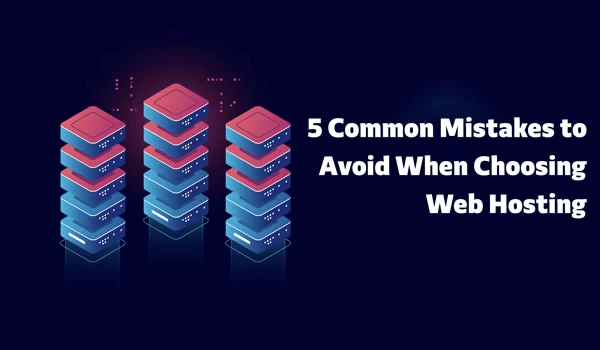Quality web hosting service is crucial for your online business needs. Sometimes even experienced users can make mistakes thinking about choosing the right things for their website. And trusting not-so-great hosting providers is one of the most common ones. But that’s not all. There is a bunch of mistakes that both novice and experienced users can do that may have serious consequences on your website performance, security, and user experience.
Choosing the wrong type of hosting
One of the most common mistakes that people do when setting up a new website. There are a lot of web hosting options available from shared plans to dedicated servers and cloud clusters. Each and every one of them has its advantages and disadvantages, but choosing the right type can save you a lot of trouble and money.
Shared hosting is usually the most affordable type of hosting, where multiple users share a single server. While it is great for low-traffic websites, you can’t host big projects or multiple websites on one account because of the limited resources of the server.
VPS are more powerful and offer an opportunity to control your resources. While it sounds great, that may not be a good fit for a lot of users, because it requires some technical knowledge to manage it.
Dedicated servers are one of the most powerful options on the market. It offers almost unlimited resources because you have a whole server for yourself. It is the most suitable option for high-demanding websites, but they can be expensive and require a whole set of technical skills to guarantee it is working correctly.
Ignoring security
Maintaining a high level of security is often easier said than done. Security breaches are not uncommon, especially for less experienced users, and can lead to downtime, data loss, and permanent damage to your website and users. So we advise you to take a look at some of the things, that can prevent security fails:
- Use stronger passwords: We constantly hear about using stronger passwords to keep us protected. But do you know what a strong password is? Use lowercase and uppercase letters, numbers, and special characters, and make sure your password isn’t used across multiple websites.
- Use SSL certificates: Secure Sockets Layer or commonly known as SSL are certificates that secure data transmission between users and websites. Not using one on your website can make it vulnerable to hacker attacks and expose your data.
- Backup your website: That’s something crucial in case something is wrong. Having your data backed up can prevent data losses and website downtime;
- Keep your software up-to-date: Some software updates include security patches and bug fixes. Keep every plugin or theme updated to the latest version to increase security levels.
Picking low-cost or free web hosting service
More expensive usually means superior quality. While that isn’t always true about web hosting, choosing the cheapest option isn’t exactly a great idea. Free hosting services or the cheapest options seem the most appealing for customers on a tight budget but keep in mind that these few dollars saved can negatively impact your website performance and security. Consider choosing the best price-quality ratio and don’t blindly trust the cheapest option, because:
- It offers limited resources: Limited storage, bandwidth, and resources can result in slow loading speed and limited functionality of your website.
- Unreliable uptime: Lower-priced options usually have a lower uptime guarantee, which can result in your website being unavailable for extended periods.
- Security risks: Lack of security features, DDoS protection, and automatic backups can put your website at risk.
Ignoring user reviews
User reviews often provide quality feedback on certain web hosting providers. When choosing a hosting plan for your needs, make sure to check several websites and carefully read feedback on the brand. This can inform you about the main pros and cons of that certain product and will help you take an informed decision.
Choosing web hosting without a refund policy
Money-back guarantee can provide some benefits for you. Usually hosting companies provide a trial period with a 30-day money-back guarantee, but certain brands can offer you up to 3 months for free.
Refund policies can protect you from scams, but also will allow you to research every aspect of the chosen plan. If you are not satisfied with the results, just ask the support about a refund and that’s all.
